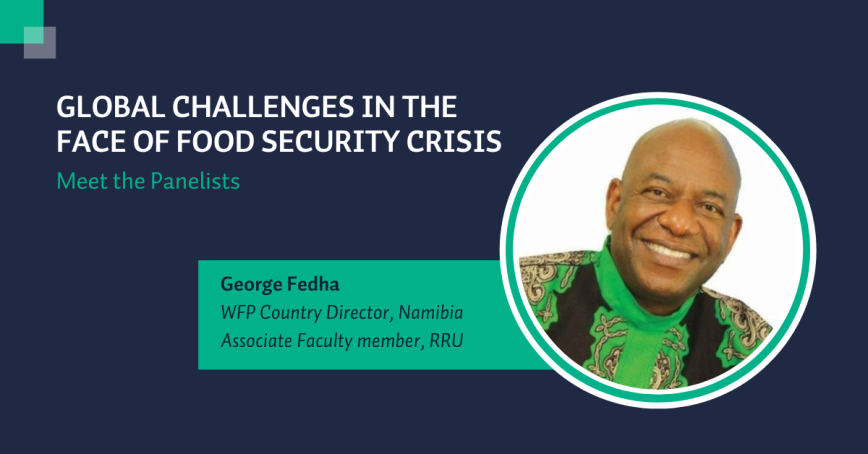Meet the panelist: George Fedha on hunger and climate shocks in Namibia

Meet George Fedha, the World Food Programme Country Director of Namibia and associate faculty member in the Master of Arts in Global Leadership program at Royal Roads University. He's one of three World Food Program Leaders speaking at the Sept. 6 event, Global Challenges in the Face of Food Security Crisis, happening both in person and online. We asked him about Namibia's current food security situation, climate challenges and what keeps him motivated. Here's what he said.
Q: Can you provide an overview of the current food security situation in Namibia?
The food insecurity and malnutrition situation in Namibia, especially among the vulnerable rural communities, continues to deteriorate due to the consequences of years of successive droughts. COVID-19 has negatively impacted food systems and food supply chains leading to food supply bottlenecks. This has resulted in a rise in hunger, risk of malnutrition, and poverty, dropping Namibians to the most-poor end with approximately 447,000 people living below $1.90 per day poverty line.
Q: Namibia is an arid country. How does the World Food Program collaborate with local partners to address the unique challenges of achieving food security in such a dry environment?
Due to the prevalent climate shocks, WFP has joined or formulated critical alliances to coherently co-invest in the climate-water-energy nexus that promote techniques that substitute inappropriate practices of crop and livestock production.
This includes access to information, tools and technology packages to build soil resilience and adaptive farming practices that can utilize and recycle the limited water alliances.
Digital solutions, data analytics, artificial intelligence, digitally-delivered services and apps—are rapidly gaining ground in Namibia and more recently this is transforming agriculture and the food system. WFP is working closely with partners that specialize in food value chain to optimize remote satellite data and in-situ sensors to improve the accuracy and reduce the cost of monitoring crop growth and quality of land or water; and traceability technologies and digital logistics services offer the potential to streamline agri-food supply chains, while also providing trusted information for the community.
Q: Hunger levels have been decreasing in Namibia in recent decades. What accounts for this change?
WFP works very closely with various government and other stakeholders to enhance and strengthen social protection systems which subsequently reduce hunger-related vulnerabilities among hundreds of hungry and malnourished Namibians — and those at risk — whom we are unable to reach directly.
Namibia’s social protection system is ranked amongst the most inclusive and developed in Africa. These programs tackle multiple dimensions of poverty and deprivation such as decent work, education, health care, food security, income security. For example, it caters for the elderly, marginalized, veterans and orphans to mention a few. This has substantially reduced the effects of hunger.
Q: Your role includes strengthening the role of academia in the Food Systems approach to development. Can you speak more about that work, and they ways in which women and youth are particularly involved?
Africa consists of the world’s largest youth population – this is an opportunity for the succession of youth into more inclusive and sustainable food systems and the ability of young people and women to secure decent work and dignified livelihoods, healthy diets, and strengthened resilience. Most of the countries in Africa have populations with median ages under 20, and the demand is rising for nutritious food, access to information and resources of all kinds, more and better services, and jobs amid a crisis where many countries are not yet structured to generate enough quality employment.
Therefore, combining the transformative trends of food systems and innovation often finds suitable place for dialogue in academia and subsequently contributes to the research and learning agenda that is so much needed to change lives.
Q: You’ve been involved in humanitarian and development efforts for 30 years now. What keeps you motivated?
I have been privileged to serve with individuals and communities who rise above adversity. For example, I worked in a team that witnessed a close-to-death malnourished child in Somalia grow up to become a productive adult member of the community. I also worked with a women’s group in South Sudan who progressed from a vulnerable group without assets to a powerhouse that now runs a local supply chain enterprise. There are zillions of moments that keeps one going and staying motivated. We can change the world.